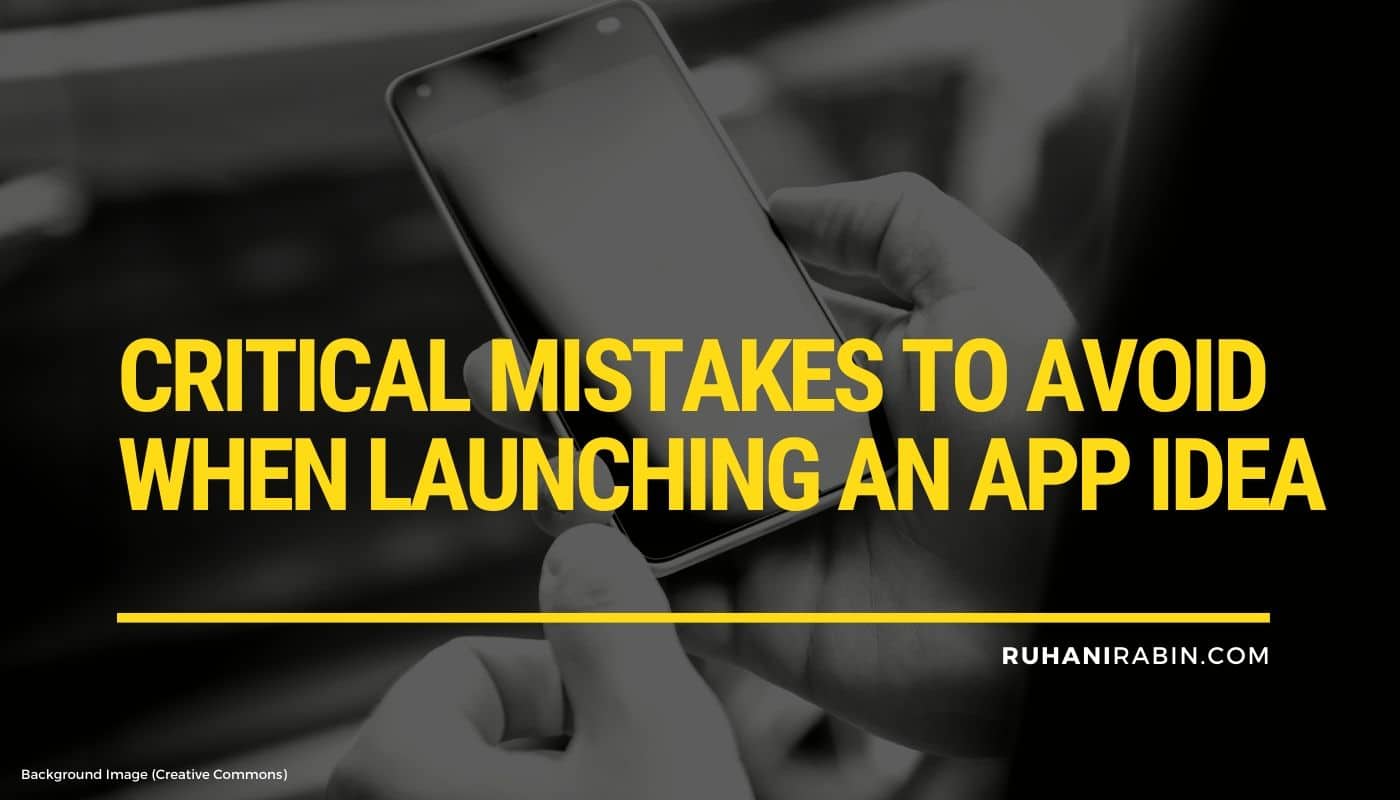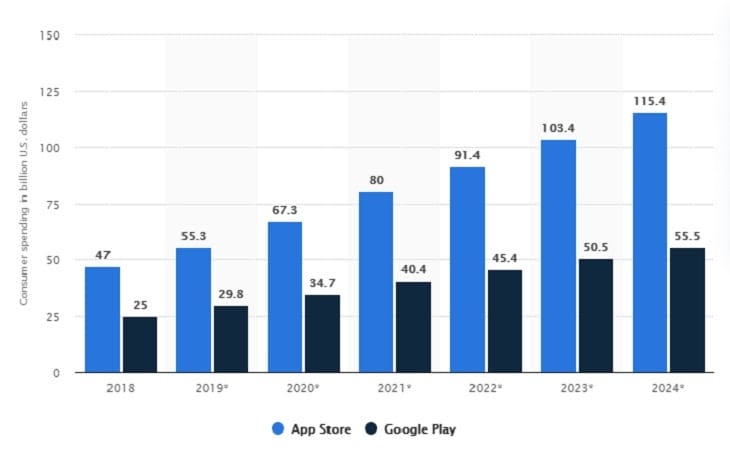5 Critical Mistakes to Avoid When Launching An App Idea
Understandably, having an idea, and launching an app isn’t enough. Therefore, you must avoid these five critical mistakes when you set out to launch a mobile app for your business.

There is a slew of statistics on the internet to support a business’s decision to go mobile. Take, for example, these in consideration:
- Worldwide, mobile users are expected to grow to 7.26 billion by 2022.
- App downloads in 2019 were 17% higher than that in 2018.
- By 2020, the mobile app consumer expenditure could cross 67.3 billion USD.

Especially now, during the Covid-19 outbreak and subsequent global isolation phase, the world is recording an unprecedented rise in web and mobile traffic. Under these circumstances, creating responsive user experiences through mobile applications can be profitable for almost all types of companies.
But, although the mobile industry is continuously rising, every app doesn’t bring favorable outcomes. Together, Google, Amazon, Apple, and Windows app stores have over 5.5 million applications. And yet, only a portion of them have crossed the 1M installation mark. Nearly one-third of applications get uninstalled within a month; over 80% of them are abandoned within three months.
Understandably, having an idea, and launching an app isn’t enough. Therefore, you must avoid these five critical mistakes when you set out to launch a mobile app for your business.
Get the Best Updates on SaaS, Tech, and AI
The Success Rate of Mobile Applications-Here’s Why Not All of Them Work
Several factors could cause the failure of a mobile app.
- The application fails to solve a real user problem.
- It’s too complicated for users.
- The audience can’t connect with the application’s objective.
- It has too many unnecessary features or not enough important ones.
- Poor user experience and performance issues
- Longer loading time
- Complicated registration process
- Bugs, navigation flaws, and other operational issues
- Poor backend support
- Poor choice of platform for the application
- Lack of well-organized monetization strategy
- Inadequate design and functionality update support
Most of the apps that fail to rake in profits share a few or more of these problems. Therefore, it’s wiser to adopt a multi-faceted strategy when developing your mobile application and thoroughly analyze it for potentially fatal issues before the launch.
5 Must-Avoid Mistakes When Launching an App Idea
1. Inadequate Market Research
Building an app that has no real market demand is one of the most terrible mistakes a business can make. You have to understand what your target audience needs and focus on the right pain point(s) during the development process.
By gathering customer insights about their needs, market opportunities, desired features, expectations, and competitor’s flaws, you can significantly increase the likelihood of success for your app. That’s where comprehensive market research can provide an influential direction to your development team.
- Study the competition
- Find the market gap
- Identify the ideal buyer
- Understand the targeted audience
- Interact with them to recover their biggest unsolved pain point in your context
- Devise a solution that considers all these parameters
This approach will offer more certainty to launching your app idea while minimizing its risk factor.
2. Bloated Application Design
Bloated applications become increasingly slower, charge more processing power, and waste away additional disk space. Plus, every new feature increases the overall development time and expense. That’s why it becomes essential to draw a definite line between a feature-rich application and an overcrowded one.
Instead, you should only incorporate highly targeted features that can add value to the user’s experience and serve a purpose.
Also, including limited features in the first version of a mobile app allows businesses to test their assumptions in the market. You get enough time to gauge the reaction of your audience and distinguish between value-adding features and filler ones without putting much at risk.
3. Lack of Testing
Excessive loading time, poor onboarding experience, and extreme battery or space drainage are some of the biggest reasons why users uninstall applications. Often, the cause behind such bugs is an inadequate testing cycle, i.e., one of the biggest mistakes to avoid when launching an app idea.
Usually, the sooner you can find a bug in an app, the better. The cost of fixing problems in a mobile application rises exponentially with time. Plus, once deployed, reverting a user’s negative first-time impression of an application and hence, of the related brand is challenging.
It is suggested to follow a thorough testing process after developing an app. However, you can also test the app idea in real-time amidst real customers. That can be achieved via a solution delivery system that can mimic your ideal app experience. On a small scale, this trick can help you test the app idea before you can invest in a scalable product.
4. Poor Marketing Strategy and Delayed Promotion
A marketing plan is an essential prerequisite to establishing a cycle of interest, trial, commitment, purchase, and referrals.
Failing to promote your app to the right audience can negatively impact the profitability of the product. The more it is delayed, the longer it would take for your app to create a decent return on investment. However, when you start promotions in the initial stage, it becomes easier for an app idea to transition into a profitable venture. Doing so will help you connect to potential customers, build awareness about your product, and optimize it for efficiency by analyzing the continuous incoming feedback.
During the pre-launch app development process, you can-
- conduct interviews to understand your target user sentiments
- create valuable content to build an aura of anticipation among your audience about the upcoming product and your brand
- produce a podcast
- Host online or offline events as feasible, and
- get attention on social media to intensify a buzz around the upcoming application
5. Insufficient Budgeting Planning
When it comes to allocating appropriate funds to an app development project, you can go wrong in three circumstances-
- Underestimating the net budget
- Setting an unrealistic budget
- Raising too much money too quickly
Enterprise-grade app development often requires a significant investment. The overall budget considerations depend on a variety of factors, including:
- Development hours
- Resources (developers, marketing experts, designers, etc.)
- Material
- Space
- Operational expenses
- Features and functionalities
- Complexity of development
- Technology stack being used
You must completely understand the product’s scope and then allot a reasonable overall budget to the project. Otherwise, you will have to face issues during app development and deployment.
At the same time, it’s necessary to consider that some app ideas easily raise a reasonable amount of funds in a short time. But, in that case, you will be answerable to investors who will start calculating the outcome and profits the moment your app is released. This could raise an issue if your app doesn’t gain traction quickly.
The Takeaway- Make Wise Decisions and Minimize The Risk for You App
It helps to remind yourself before launching an app idea that its ultimate motive is to create profits and growth opportunities for your business. Paying attention to the mistakes that can affect that outcome will help accelerate the success of your app.
Of course, there are a number of factors apart from the ones we discussed that can affect the performance of a mobile app. But, paying attention to these common critical mistakes when working with an app idea can significantly enhance your chances of succeeding.
Nathan Smith is a mobile app development expert at TechnoScore. He has worked on numerous application development projects. He likes to use his acquired knowledge of technologies, tools, and practices to help other budding developers learn from his mistakes and make better app development choices.
FTC Disclosure: The pages you visit may have external affiliate links that may result in me getting a commission if you decide to buy the mentioned product. It gives a little encouragement to a smaller content creator like myself.


